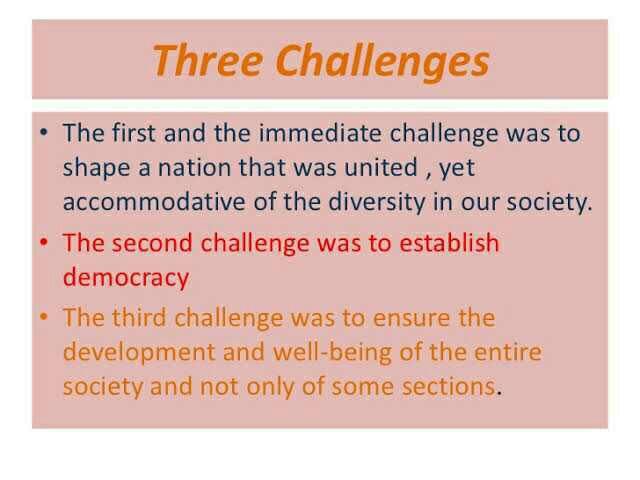Class 12 Exam > Class 12 Questions > What are three challenges faced by India duri...
Start Learning for Free
What are three challenges faced by India during independent?
Most Upvoted Answer
What are three challenges faced by India during independent?

Community Answer
What are three challenges faced by India during independent?
✓1.Challenge to Shape a Nation: India was divided among various states at the time of independence. Hence a great challenge arose to unify and integrate country into one bond. Sardar Vallabhbhai Patel took upon himself to integrate these states either wishfully or diplomatically to be completed into different stages.✓2. To Establish Democratic Set up: India constituted representative democracy based on parliamentary form of government and it was a great challenge to develop these democratic practices in the nation.✓3. To Ensure Development and Well Being of the Society: Indian polity made herself to achieve welfare goals with the evolvement of effective economic policies and eradication of poverty and unemployment.

|
Explore Courses for Class 12 exam
|

|
Similar Class 12 Doubts
What are three challenges faced by India during independent?
Question Description
What are three challenges faced by India during independent? for Class 12 2024 is part of Class 12 preparation. The Question and answers have been prepared according to the Class 12 exam syllabus. Information about What are three challenges faced by India during independent? covers all topics & solutions for Class 12 2024 Exam. Find important definitions, questions, meanings, examples, exercises and tests below for What are three challenges faced by India during independent?.
What are three challenges faced by India during independent? for Class 12 2024 is part of Class 12 preparation. The Question and answers have been prepared according to the Class 12 exam syllabus. Information about What are three challenges faced by India during independent? covers all topics & solutions for Class 12 2024 Exam. Find important definitions, questions, meanings, examples, exercises and tests below for What are three challenges faced by India during independent?.
Solutions for What are three challenges faced by India during independent? in English & in Hindi are available as part of our courses for Class 12.
Download more important topics, notes, lectures and mock test series for Class 12 Exam by signing up for free.
Here you can find the meaning of What are three challenges faced by India during independent? defined & explained in the simplest way possible. Besides giving the explanation of
What are three challenges faced by India during independent?, a detailed solution for What are three challenges faced by India during independent? has been provided alongside types of What are three challenges faced by India during independent? theory, EduRev gives you an
ample number of questions to practice What are three challenges faced by India during independent? tests, examples and also practice Class 12 tests.

|
Explore Courses for Class 12 exam
|

|
Signup for Free!
Signup to see your scores go up within 7 days! Learn & Practice with 1000+ FREE Notes, Videos & Tests.



















